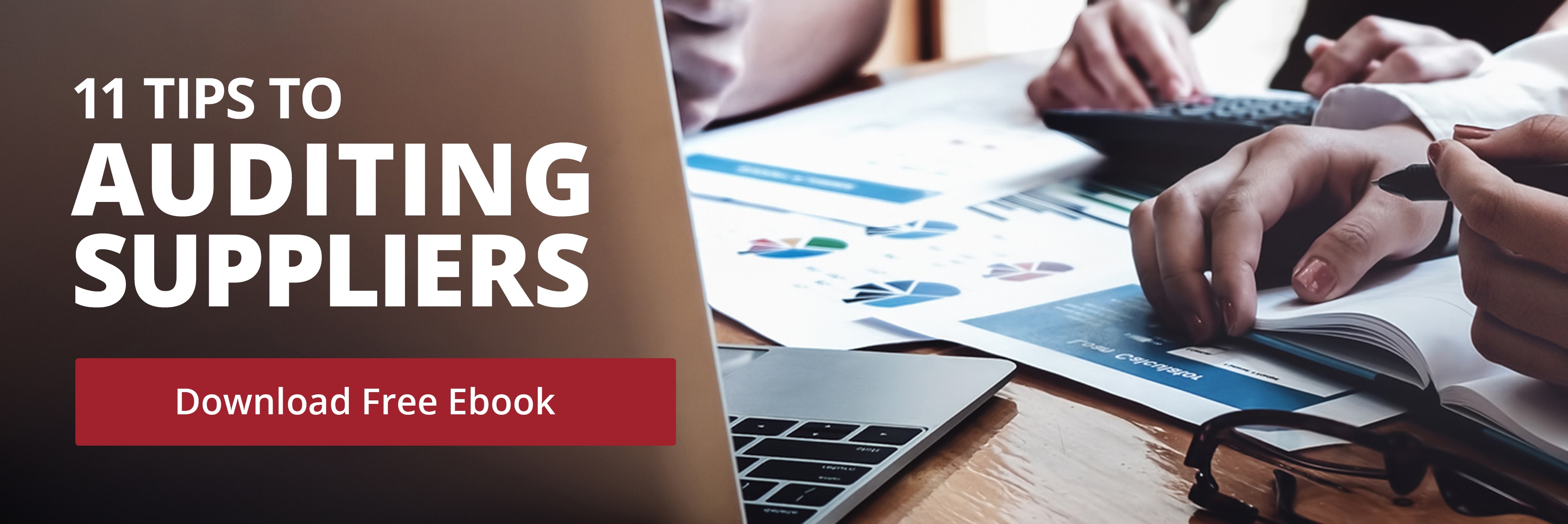As the world continues to adjust to the COVID-19 pandemic's adverse disruptions, consideration must...
How to Support Your Auditor During a Supplier Audit
Maintaining oversight and control of your supply chain is a critical part of your organization's quality management system. Effective and efficient supplier audits can have significant impact on long-term compliance profile and profitability. The quality of the audit doesn't just depend on the auditor's skills – preparation, contribution, and support by the audit sponsor is also essential.
If the supplier audit doesn't go as planned, both organizations lose time and money while failing to gain proper insights. Audits have a limited duration (usually a few days), so each step of the process should be optimized.
When you hire a qualified auditor to perform a supplier audit, you need to be fully prepared to offer your support. The audit’s efficiency and effectiveness depends in part on your ability to assist the auditor, answer questions, and provide documentation when necessary.
Design an Audit Program
By preparing an audit program in advance, you can simplify the supplier audit planning process and make sure you never miss a regular audit. The program is usually designed to look a year ahead.
The basic information your audit program should include is:
- Process for determining supplier risk levels
- Specified risk-based audit intervals
- Length of each audit in days
- Resources required to run an audit
- Who is responsible for arranging audits
Doing this as soon as possible can help avoid scheduling issues.
With a well-designed program, you don't risk overlooking important audits. It can help you also address bandwidth issues by contracting with auditors in advance – this will help to improve relationship with suppliers.
Set Appropriate KPIs
When planning an audit, you need to have a clear list of Key Performance Indicators (KPIs) for the audit process to evaluate the contracted auditor's performance.
Choosing the right KPIs can be tricky. KPIs should measure quality, timeliness and ability to identify risk. Tracking performance over time by measuring report errors, on-time delivery of outputs and corrective action closures, and risk identification (severity/quantity) are recommended, but you should be wary of only measuring volume of findings because this is one dimensional and may lead to non-value-added findings.
Provide Information for Audit Plan
Before the supplier audit begins, the auditor will ask for information to create an audit plan. While auditors may already understand your organization's needs and audit goals, these experts need important details about the suppliers they are about to audit.
- Explain your expectations and supplier responsibilities.
- Share access to the quality agreement (if any).
- Provide quality-related documentation collected from the supplier (e.g. Quality Manual).
- Share updated supplier information (location, contact details, website, products/services they provide, volume generated by the supplier, current product specifications).
- Tell the auditor if you know about supplier outsourcing, and share a list of companies they work with (if any).
- Provide notes from in-house personnel about supplier relationships and history.
- Share the history of your relationship with the supplier (complaints, nonconformities, past audit reports).
By providing detailed information to the auditor in advance, you can speed up the auditing process and make sure that it goes smoothly.
Organize/Attend Internal Pre-Audit Call
Once the auditor finishes studying preliminary information about suppliers, they may have questions. Answering them during the audit itself could cause changes to the plan and waste the auditor's time.
By arranging a pre-audit call, you can make sure the auditor has the necessary answers to proceed with the audit. Consider asking in-house specialists like purchasing department representatives and other quality department executives to join the call.
They can help answer such questions as:
- What are the applicable standards and regulations for the audit?
- What is the performance history of the supplier?
- Are there any specific areas of interest that you want to focus on during the audit?
- Should any certifications like ISO be verified?
The auditor may also have questions about the documents you collected for the audit plan or may ask you to provide additional information.
A pre-audit call is a unique opportunity to figure out if the auditor understands your supplier-related needs and requirements. This is the time to help the auditor become your representative.
Organize/Attend Supplier Pre-Audit Call
Suppliers are generally receptive to audits since they go through them for the majority of their customers. To make sure the supplier actively supports the audit, it is suggested to engage the supplier in advance to:
- Answer questions a supplier may have about the audit.
- Communicate the time, day, and duration of the audit.
- Ask for any documentation you may want to provide to the auditor.
- Ask to see any records necessary to give the auditor a better understanding of the supplier's work.
- Explain what to expect during the audit.
Keeping an audit on track can be complicated if the supplier starts asking questions (even if they are unrelated to the audit) during the process.
Use the supplier pre-audit call to deal in advance with any issues, questions, or concerns the supplier may have. That way, by the time the auditor arrives, the suppliers will give the auditor their undivided attention.
Provide a Sponsor Point-of-Contact during the Audit
During the audit, the auditor may need to contact the audit sponsor to ask questions, report non-conformities, share details, and more. However, time differences and scheduling conflicts can make contact difficult to do during the audit itself.
It's up to you to make it easy for the auditor to reach you at any point of the auditing process. If you can't be available to take the call, appoint a person responsible for auditor communication.
Attend the Audit Closing Meeting
By attending the closing meeting, you can help the auditor to make the meeting productive, and you can collect important details that may not be in the report. By announcing yourself as an observer of the meeting, you can encourage the supplier's executives to attend it as well.
During the meeting, you can discuss all issues uncovered through the audit and address some challenges and nonconformities on the spot. This can facilitate the audit corrective action and follow-up process tremendously.
If supplier's executives don't attend the meeting, their representatives may not ask appropriate questions, which would make following up more complex and time-consuming.
Find the Right Balance
When working with auditors, you need to find the right balance between challenging them and giving these experts enough space to do their job.
Providing sufficient guidance and documentation to the auditor is extremely important to ensure that sponsor requirements are satisfied. In addition to providing guidelines, it is important to also rely on the experience, training, and credentials of the auditors to conduct the supplier evaluations based on their unique perspective – this will allow for diversity of thought and application.
The Takeaway
The efficiency of the audit is directly dependent on the time and effort you spend supporting the auditor. By creating an audit program, preparing documentation, answering questions, setting KPIs, and making yourself available, you can achieve the best possible results.
The more experienced an auditor is, the less you need to arrange support. To find qualified auditors around the globe, contact Medpoint.




